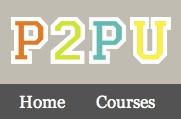A Meeting of the University and the Gift Economy

In a NY Times Magazine article entitled “Valuing $0,” Rob Walker considers the intersections of gift and market economies in our digital present, where hundreds of millions of unpaid content creators update their Facebook statuses, edit Wikipedia pages, upload photographs and videos, and author blog posts, and some of the most successful new-media enterprises have offer their services for "free" in order to capitalize on such user-generated content.
A new institution—Peer 2 Peer University (P2PU), whose name alone announces its embrace of technological, rather than traditional forms of literacy, represents an experiment with this gift economy in higher education. A “grassroots educational project” founded on the principles of openness, community, and peer learning, P2PU offers courses taught by volunteers--both expert and amateur. The courses, which generally run for six-week cycles, leverage educational materials available online to enable “learning for everyone, by everyone about almost anything.”
Since its launch in 2009, P2PU has grown from six courses to the more than forty being taught this cycle, which began on January 26. Course offerings from the university’s three schools, the School of Social Innovation, the School of the Mathematical Future, and Webcraft, include “Collaborative Lesson Planning,” “Conflict Resolution,” and “Drupal Theming and Tweaking.”
While P2PU courses are uncredited, the university is working to develop forms of recognition--which may ultimately resemble the liking of a Facebook status or the linking of a tweet. The website explains: “We want learners to get recognition for their achievements, but we don't issue any kind of accredited or official certificates ourselves. We are working on cross-accreditation with a few partners, but P2PU certificates are more ‘artworks’ than ‘degrees.’” This understanding of the art of learning itself echoes a work Walker introduces in "Valuing $0": Lewis Hyde's The Gift, which advises artists and writers that enduring creation must not be tailored to the demands of the market, but should instead be produced in a gift economy.
Uncredited, online, and led by amateurs as well as experts, P2PU obviously offers an education very different from that of Berkeley. But it will nonetheless be an interesting initiative to follow--in part because it is modeled on the gift economy that has seen remarkable successes in the age of digital technologies.
In a recent Lab Blog post, my colleague Jeff Rogers notes that because the first generation of OpenCourseWare projects developed at traditional universities were typically funded by finite grants, they faced the challenge of sustainability. One possibility for a sustainable future for OpenCourseWare in the next generation "2.0" would be to rely distance learning courses offered for credit. Another, that demonstrated by P2PU, might involve a flattening out of academic hierarchies, so both learning and teaching are open to all. The losses incurred in such a model seem obvious, but the gains may also be significant. And while it remains to be seen whether P2PU has staying power, what is clear is that the institution is offering something radically different, a model of education that resembles not a traditional university, but some of the most successful businesses to emerge from the age of digital technologies.